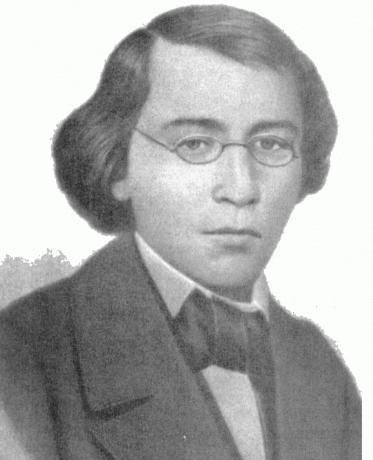Where does the name of the Dobrolyubov article come from? Recall that in Goncharov’s work Ilya Ilyich Oblomov himself called the reason for his self-destruction shortly and succinctly: “Oblomovism”.
Nikolai Alexandrovich Dobrolyubov showed the whole society how a terminally ill person, yesterday’s student, a writer who does not write novels, can become a classic. His article was immediately noticed. The meaning is an explanation of Oblomov’s phrase. This is done subtly and vividly, in the context of how Dobrolyubov himself understood what Oblomovism is. A summary of this famous work we bring to your attention.
Hereditary nobles and boyars - "Oblomovites"?
What does a literary critic write about? The fact that Goncharov was able to consider the true Russian character and reveal it mercilessly and reliably. Indeed, it was then. The worst part of the nobility and nobility, realizing that they won’t do anything really for society, lived, reveling in its wealth, only for its own pleasure. The drowsy “life of the stomach” existence of this layer of society corrupted the rest of Russian society. The writer makes a harsh historical verdict to the nobility and nobility in Russia: their time has passed irrevocably! Dobrolyubov's article “What is Oblomovism?” openly denounces the antisocial nature of the "Oblomovites": contempt for work, consumer attitude to women, endless vocabulary.
By the way, this is the same as our contemporary classics, such as Victor Pelevin: brand glamor and discourse, just named differently. After all, modern neobarism and dishonesty have given rise to new parasite people.
All Russia - Oblomovka
The name of the village - Oblomovka - is extremely generalized by the critic. In his own way, in the context of Goncharov’s novel, Nikolai Dobrolyubov sees what Oblomovism is. The summary of his article gives a clear idea of Russia as a combination of thousands and thousands of villages of Oblomovok. Of course, not literally, but figuratively. Huge resources are stupidly owned by nobles, who are often parasitic people, in essence a rentier, deeply despising their compatriots, not striving to do anything constructive for society. As a result, society loses momentum, becomes passive, plunges into crisis.
The problem of a new person
We need a reboot, it is necessary that new people appear in power and in industry. Goncharov therefore created the image of the active and creative Andrei Stolz. “However, there are none at the moment!” - says in his article Dobrolyubov "What is Oblomovism?" A summary, or rather an exposition of his subsequent thoughts, is the potential inability of Stoltsev to become the "mind and heart" of Russia. Unacceptable for people performing such an important mission is the “bow your head” reflex to circumstances when it seems to them that these circumstances are stronger. “Social progress requires more dynamics than Stolz has!” - considers Dobrolyubov.

What is Oblomovism? The summary of the article, where this question was first raised, indicates that Goncharov’s novel itself also contains an antidote to this disease of society. The image of Olga Ilyina, a woman who is open to everything new, not afraid of any challenges of the time, who does not want to wait in fulfillment of her aspirations, but, on the contrary, to actively change the surrounding reality herself. “Not Stolz, but Olga Ilyin can be called in Lermontov's“ a hero of our time! ” - considers Dobrolyubov.
conclusions
How much can a person under 25 do? On the example of Nikolai Aleksandrovich, we see that he can not so little - notice himself and point out to others “light” in the midnight darkness, express his thought in an exhaustive, bright and capacious way. In the room adjacent to the literary genius fading away from a deadly disease, N.G. Chernyshevsky, who continued the friend’s thought "hovering in the air," powerfully raising the question before his compatriots: "What to do?"
Not only Dobrolyubov answered "What is Oblomovism?" Briefly, succinctly, artistically reliably, he emphasized the corrupting influence of the principles of serfdom, the need for further social progress. Perhaps that is why his author's assessment of the novel by Ivan Alexandrovich Goncharov “Oblomov” became both famous and classic.